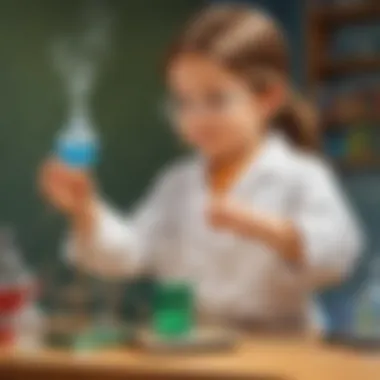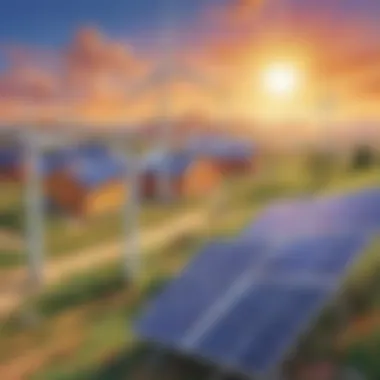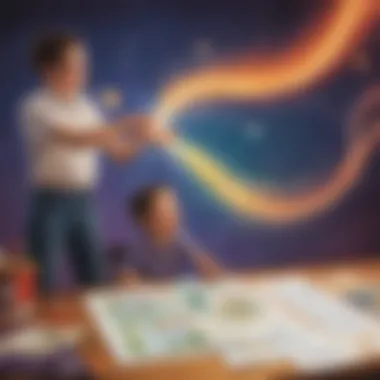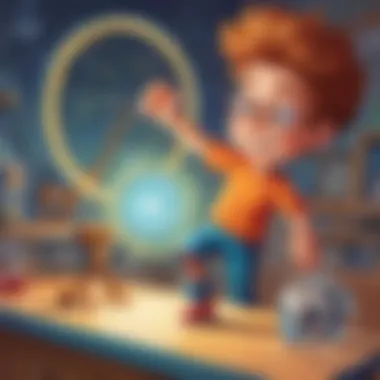Engage Young Minds: Energy Lesson Plans for Science Enthusiasts


Science Fun Facts
Energy is a fundamental concept in the world of Science, providing the power for everything around us, from the glow of a light bulb to the movement of vehicles. Understanding energy can be exciting, as it opens up a realm of possibilities for curious minds to explore.
Interesting Trivia and Facts
Did you know that the sun produces enough energy in one hour to meet the Earth's energy needs for an entire year? It's incredible how a massive ball of gases can fuel our planet's activities.
Quirky Science Stories
In the 19th century, Thomas Edison, the inventor of the light bulb, conducted over 10,000 experiments before successfully creating a long-lasting, practical electric light bulb. This goes to show that perseverance and dedication are essential in the world of Science.
Amazing Science Records
The largest man-made explosion ever recorded was the Tsar Bomba detonated by the Soviet Union in 1961. This explosion released energy equivalent to about 1,400 times the combined power of the bombs that destroyed Hiroshima and Nagasaki in World War II.
Thought-Provoking Questions
How does energy transfer from one form to another? Why is it important to conserve energy in our daily lives? These questions ignite critical thinking and encourage young Science enthusiasts to delve deeper into the realm of energy.
Discover the Wonders of Science
Jumping into the fascinating world of Science, where possibilities are endless and discoveries await at every turn. Let's embark on a journey of exploration and learning that will spark creativity and curiosity.
Exploring Various Scientific Concepts
From potential and kinetic energy to renewable sources like solar and wind power, there are numerous scientific concepts waiting to be unravelled. Each concept offers a unique perspective on how energy shapes our world.
Educational Videos and Animations
Visual aids are powerful tools in understanding complex ideas. Through engaging videos and interactive animations, young learners can grasp intricate scientific concepts in a fun and easily digestible manner.
Interactive Learning Tools
Online platforms and apps provide interactive learning experiences that make studying energy engaging and effective. From virtual experiments to simulations, these tools enhance comprehension and retention.
Real-Life Applications of Science
Discovering how scientific theories are applied in real-life scenarios can be mind-boggling. From how energy powers our homes to the mechanisms behind hybrid cars, exploring these applications bridges the gap between theory and practice.
Science Quiz Time
Engaging in a bit of fun and challenging our knowledge with interactive quizzes and brain teasers. Let's test our understanding of energy concepts through exciting and thought-provoking questions.
Interactive Quizzes


Putting our knowledge to the test with quizzes that cover a wide range of energy-related topics. These quizzes encourage active participation and reinforce learning in an enjoyable way.
Multiple Choice Questions
Answering multiple-choice questions sharpens our decision-making skills and provides instant feedback on our comprehension of energy principles. It's a dynamic way to gauge our understanding.
Brain Teasers and Puzzles
Challenging our minds with puzzles that require critical thinking and logic. From energy riddles to mathematical puzzles, these brain teasers keep our cognitive abilities sharp.
Learning Through Gamification
Incorporating elements of gamification into learning experiences adds an element of fun and competition. By turning energy concepts into games, learning becomes interactive and engaging.
Science Experiment Showcase
Immersing ourselves in hands-on experiments that bring energy concepts to life. Let's roll up our sleeves, gather our materials, and embark on a journey of discovery through exciting experiments.
Fun and Engaging Experiments
Exploring experiments like creating a potato battery or constructing a simple wind turbine allows us to witness energy in action. These experiments create lasting impressions and deepen our understanding.
Step-by-Step Instructions
Following clear and concise instructions ensures the smooth execution of experiments. Detailed step-by-step guides make it easy for young Science enthusiasts to replicate and understand the principles behind each activity.
Materials List
Listing out the required materials beforehand helps in proper planning and preparation for the experiments. From common household items to specific tools, having the right materials is essential for successful experimentation.
Safety Tips and Precautions
Prioritizing safety is paramount when engaging in Science experiments. Understanding and following safety tips, such as wearing protective gear and having adult supervision, ensures a secure and enjoyable learning experience.
Introduction
In this section, we delve into the captivating world of energy education tailored for young science enthusiasts aged 6-12. Energy, a fundamental concept in science, plays a crucial role in shaping young minds and fostering curiosity. Through carefully curated lesson plans and activities, children can not only learn about the various forms and sources of energy but also cultivate a deeper understanding of their importance in our daily lives.
Understanding the Importance of Energy Education
Impact of Energy Education on Young Minds
Energy education has a profound impact on the cognitive development of young minds. By exposing children to energy concepts at an early age, we lay a strong foundation for future learning and environmental awareness. Children develop critical thinking skills and an appreciation for sustainable practices, preparing them to become responsible global citizens. The interactive nature of energy lessons stimulates curiosity and engagement, making learning a fun and enriching experience for young learners.
Integration of Energy Concepts in Early Education
Integrating energy concepts into early education is essential for providing a holistic learning experience. By infusing energy topics into the curriculum, educators can create connections between theoretical knowledge and real-world applications. This interdisciplinary approach fosters creativity and problem-solving skills in students, allowing them to explore the practical implications of energy in various fields. Early exposure to energy concepts sets the stage for a lifelong interest in science and technology.


Overview of Energy Lesson Plans
Purpose and Benefits of Energy Lesson Plans
Energy lesson plans serve a dual purpose of educating and engaging young learners. By structuring learning objectives around energy concepts, educators can facilitate a deeper understanding of complex scientific principles. These lesson plans not only promote intellectual growth but also encourage students to think critically and analytically. The benefits of energy lesson plans extend beyond the classroom, empowering children to make informed decisions about energy usage and sustainability.
Key Components of Effective Energy Education
Effective energy education relies on key components that enhance the learning experience. By incorporating hands-on activities, visual aids, and interactive resources, educators can create a dynamic educational environment for students. Practical demonstrations and group projects enable children to apply theoretical knowledge to real-world scenarios, reinforcing their comprehension and retention of energy concepts. A multidimensional approach to energy education ensures that students develop a comprehensive understanding of the subject.
Interactive Experiments
In delving into the realm of Interactive Experiments within the ambit of energy education for young enthusiasts, aged 6-12, an essential avenue unveils. Interactive experiments serve as the cornerstone for engaging young minds, fostering a deep connection with scientific concepts. By immersing children in hands-on activities, these experiments kindle a sense of curiosity and exploration, making learning experiential and memorable. Through hands-on engagement, children not only grasp theoretical principles but also develop critical thinking and problem-solving skills. The dynamic nature of interactive experiments not only captivates young learners but also instills a lifelong love for science.
Hands-On Energy Activities
Creating a Simple Circuit
Being an integral part of energy education, creating a simple circuit holds paramount significance in this narrative. Äsi, forming the basis of electrical understanding, the process of constructing a circuit contributes substantially to the overall comprehension of energy flow and conductivity among young learners. The simplicity and efficacy of this activity make it a popular choice for imparting fundamental electrical concepts. Enabling children to build a circuit from scratch elucidates the connection between energy source, conductors, and load, offering a practical illustration of electricity in action. Despite its simplicity, creating a simple circuit elucidates complex concepts in a straightforward manner, making it a valuable tool for enhancing energy literacy among little science enthusiasts.
Exploring Renewable Energy Sources
Within the realm of energy exploration, delving into renewable sources stands as a pivotal aspect of education. Immersing young minds in the realm of renewable energy not only introduces them to sustainable practices but also instills a sense of environmental consciousness at an early age. By shedding light on sources such as solar, wind, and hydroelectric power, children grasp the significance of harnessing natural resources for energy generation. This exploration not only broadens their understanding of energy production but also cultivates a sense of eco-awareness, propelling them towards a greener future.
Experiment-Based Learning
Building a Solar Oven
The construction of a solar oven embodies the essence of hands-on, practical learning in the domain of energy education. By constructing a solar oven, young learners delve into the realm of solar energy utilization, understanding how sunlight can be harnessed for practical purposes. This hands-on activity not only demonstrates the principles of solar heating but also encourages creativity and innovation among children. Drawing a direct link between solar power and everyday applications, building a solar oven instills a sense of sustainability and ingenuity, fostering a holistic understanding of renewable energy.
Simulating Energy Transfer
In the realm of energy dynamics, simulating energy transfer stands out as a defining activity for young science enthusiasts. By engaging in simulations that showcase energy conversion and transfer processes, children gain insights into the mechanisms governing energy flow in various systems. This hands-on approach not only elucidates concepts of energy transformation but also cultivates analytical thinking and problem-solving skills. Through simulating energy transfers in different scenarios, children acquire a comprehensive understanding of how energy interacts within different environments, laying a solid foundation for further exploration and learning.
Educational Resources
Education for children from ages 6-12 is crucial, requiring a tailored approach to ensure optimal engagement and learning retention. The educational resources segment in this article plays a pivotal role in providing enriched learning experiences for our little science enthusiasts. These resources encompass a wide array of materials, tools, and platforms designed to supplement traditional teaching methods effectively. By leveraging educational resources, we aim to stimulate curiosity, foster critical thinking skills, and enhance understanding of scientific concepts. The educational resources section includes a diverse range of materials tailored to cater to the specific needs and learning styles of elementary school children. From interactive online platforms to printable worksheets, these resources aim to make complex scientific topics accessible and engaging for our young audience. Consistency in content quality and alignment with curriculum standards are paramount considerations when selecting educational resources, ensuring that the materials resonate with the intended age group and educational objectives.
Online Tools and Platforms
In the realm of energy education, online tools and platforms serve as indispensable resources for delivering interactive and engaging learning experiences. Within this domain, the focus lies on the utilization of technology to enhance comprehension and make learning enjoyable for young learners. Interactive websites dedicated to energy learning offer a dynamic platform for children to explore various energy concepts through simulations, games, and engaging activities. These websites not only provide valuable information but also cultivate a sense of discovery and experimentation in children, making learning an exciting adventure. Virtual energy labs stand out as a revolutionary tool that bridges the gap between theoretical concepts and real-world applications. Through virtual simulations and hands-on experiments, children can grasp abstract energy principles in a tangible way, fostering deeper understanding and retention. The immersive nature of virtual energy labs enables children to engage with complex ideas in a playful yet educational manner, promoting independent exploration and discovery.
Printable Worksheets and Guides
Energy vocabulary activities serve as an essential component in expanding children's scientific literacy and language proficiency. By integrating vocabulary-building exercises into energy lesson plans, educators can enhance children's understanding of key energy concepts while strengthening their communication skills. These activities not only reinforce subject-specific terminology but also encourage critical thinking and reflection, nurturing a holistic approach to learning. Energy conservation tips for kids offer practical guidelines for young learners to apply energy-saving practices in their daily lives. Through simple, actionable tips and guidelines, children can develop an eco-conscious mindset and contribute to sustainable practices within their homes and communities. By instilling early habits of energy conservation, children become stewards of the environment, promoting a culture of sustainability and responsibility from a young age.
Quizzes and Assessments


Quizzes and assessments play a pivotal role in reinforcing knowledge, identifying areas of improvement, and tracking the progress of students. In this article, the focus is on implementing quizzes and assessments as strategic tools to enhance the learning experience of children aged 6-12. Through thoughtful design and execution, quizzes and assessments within energy education can foster a sense of accomplishment and motivate young learners to delve deeper into the intricacies of science.
Engaging Quiz Formats
Interactive Energy Quizzes
An innovative segment within the realm of energy education, interactive energy quizzes aim to transform traditional assessment methods into dynamic, engaging experiences. These quizzes are characterized by their real-time feedback mechanisms, captivating visuals, and interactive elements that not only test knowledge but also promote active learning. By immersing children in a virtual quest for energy enlightenment, interactive energy quizzes offer a gamified approach to education.
Interactive energy quizzes excel in promoting retention through immersive activities and immediate feedback loops. The interactive nature of these quizzes fosters engagement and ensures that learners remain actively involved throughout the assessment process. Additionally, the gamification elements incorporated in these quizzes make learning fun and exciting, providing a refreshing take on traditional assessment practices.
Energy Knowledge Assessments
Conversely, energy knowledge assessments serve as comprehensive tools for evaluating the broader spectrum of children's energy literacy. These assessments focus on testing not only factual knowledge but also the application of concepts in real-world scenarios. By delving deeper into the foundational aspects of energy education, energy knowledge assessments offer a holistic view of students' grasp of key scientific principles.
Energy knowledge assessments prioritize critical thinking skills, problem-solving abilities, and conceptual understanding. Through scenario-based questions and analytical challenges, these assessments encourage children to think beyond rote memorization and apply their knowledge to practical situations. By incorporating energy knowledge assessments into the educational framework, educators can assess the depth of understanding and nurture a well-rounded scientific acumen in young learners.
Tracking Progress and Learning Outcomes
Importance of Assessing Energy Literacy
At the core of energy education lies the crucial task of assessing energy literacy among young learners. Understanding the significance of assessing energy literacy is pivotal in shaping effective lesson plans and optimizing educational outcomes. By evaluating children's energy literacy, educators can tailor teaching methodologies, identify gaps in knowledge, and adapt learning materials to enhance comprehensibility.
Assessing energy literacy goes beyond testing factual recall; it delves into the realms of conceptual mastery, critical analysis, and practical application. With a focus on nurturing a profound understanding of energy concepts, assessing energy literacy enables educators to scaffold learning experiences that resonate with the cognitive development of children. By emphasizing the importance of energy literacy assessment, educators can establish a solid foundation for advanced scientific exploration in young minds.
Utilizing Quizzes as Learning Tools
In the landscape of education, quizzes serve as versatile tools that not only assess knowledge but also promote learning through active participation. Utilizing quizzes as learning tools within the context of energy education facilitates experiential learning, promotes knowledge retention, and encourages self-assessment. By engaging children in quiz-based activities, educators can instill a sense of curiosity, foster engagement, and reinforce key energy concepts effectively.
Quizzes as learning tools offer a dynamic approach to reinforcing theoretical concepts, fostering practical application, and gauging comprehension levels. Through the interactive nature of quizzes, children are encouraged to explore, experiment, and discover scientific principles in an engaging manner. By harnessing the power of quizzes as learning tools, educators can create a stimulating learning environment that inspires a lifelong passion for science in young learners.
Conclusion
In this final segment of our exploration into engaging energy lesson plans for little science buddies, we culminate our discussion by reflecting on the significance of empowering young minds through energy education. The overarching goal of this conclusion is to underscore the pivotal role that educational initiatives play in nurturing a generation well-versed in sustainable energy practices. By instilling a sense of curiosity and exploration early on, we pave the way for a future where innovations in energy education serve as catalysts for change. The dual focus on encouraging curiosity and fostering a sustainable mindset equips young learners with the tools necessary to navigate the complexities of energy conservation and renewable resources.
Empowering Young Minds Through Energy Education
Encouraging Curiosity and Exploration
In delving into the realm of encouraging curiosity and exploration within the context of energy education, we unearth a fundamental aspect that drives learning forward - the innate human desire to question, explore, and discover. By promoting environments that stimulate curiosity, educators can inspire young minds to engage actively with energy concepts, sparking a natural sense of wonder and inquiry. The choice to emphasize curiosity in this article stems from its proven ability to fuel deeper understanding and long-lasting retention of information. A unique characteristic of encouraging curiosity lies in its adaptive nature, tailoring learning experiences to suit the individual learner's pace and interests. While its advantages in boosting engagement and knowledge retention are evident, careful consideration must be given to ensuring a balance between free exploration and structured learning.
Fostering a Sustainable Mindset
Transitioning to the exploration of fostering a sustainable mindset within the scope of energy education, we encounter a crucial element that underpins responsible energy consumption and conservation practices. By imbuing young learners with a sense of responsibility towards the environment, educators cultivate a mindset geared towards long-term sustainability and eco-conscious decision-making. The key characteristic of fostering a sustainable mindset lies in its capacity to instill values of stewardship and empathy towards the planet, equipping children with the awareness needed to address global energy challenges proactively. A unique feature of this approach is its holistic view, encouraging not just knowledge acquisition but also ethical considerations essential for informed decision-making. While its benefits in shaping environmentally conscious citizens are notable, educators must be mindful of potential obstacles in balancing advocacy with age-appropriate content delivery.
Future Prospects for Energy Learning
Innovations in Energy Education
Turning our attention to future prospects for energy learning, we delve into the dynamic landscape of innovations propelling educational approaches towards a more immersive and effective realm. Innovations in energy education signal a shift towards interactive, multidisciplinary learning experiences that integrate theoretical knowledge with practical applications. The key characteristic of such innovations lies in their adaptability to diverse learning styles and preferences, catering to the evolving needs of digitally native learners. A unique feature of these advancements is their potential to bridge the gap between classroom instruction and real-world energy challenges, offering immersive simulations and hands-on experiences. While the advantages of innovation in energy education are clear in enhancing student engagement and comprehension, careful assessment of accessibility and inclusivity remains essential for ensuring equitable learning outcomes.
The Role of Technology in Enhancing Learning
Concluding our exploration with a focus on the role of technology in enhancing learning, we acknowledge the transformative influence of digital tools in enriching energy education experiences. Technology serves as a facilitator in bridging gaps, offering interactive platforms, simulations, and virtual labs that make complex energy concepts accessible and engaging. The key characteristic of technology in education lies in its ability to democratize learning, breaking down barriers to entry and fostering digital literacy among young learners. A unique feature of technology integration is its scalability, enabling educators to reach a wider audience and personalize learning experiences based on learner needs. While the advantages of technology-enabled learning are evident in promoting self-directed learning and global connectivity, the potential risks of over-reliance on technology call for a balanced approach that integrates digital tools judiciously within the learning ecosystem.







